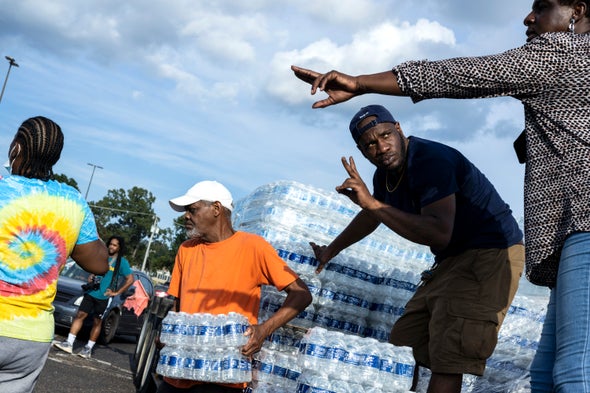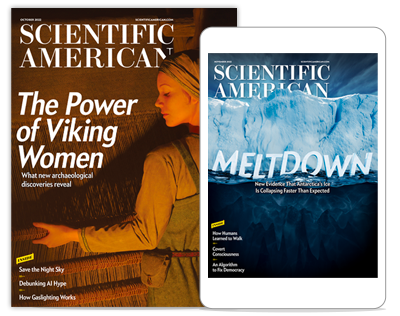Last summer, Jackson, Miss.’s public water system collapsed. Residents (including my father) had been sounding the alarm for decades, but no one in a position to stop the city’s downward spiral acted to stop it. Or if they did, they didn’t act.
It all hit me the last time I visited my father in Jackson just before he died in December 2016. On what would be my last drive around town with my dad, we visited my old neighborhoods, my old childhood homes and my old schools. Things had gotten worse since I’d left after high school.
Back then I was working toward my doctor of science degree in environmental health at the Harvard T.H. Chan School of Public Health. As my dad and I drove by one of my favorite childhood libraries, literally caving from water damage, I experienced both anger and survivor’s guilt. Would I be who I am now if I lived in what Jackson is today? That library, now closed, was once a place where I could escape my life as a poor Black child and read books that transported me into worlds beyond the boundaries erected by my circumstances. I wondered about the young, disproportionately poor and Black people in Jackson now. How could they achieve their dreams while having to overcome obstacles that I didn’t as a child? As our research showed, when a boil-water advisory was issued, the truancy rate in the public schools increased by up to 10 percent.
Like many places across the United States—think Flint, Mich. or Birmingham, Ala.—Jackson has suffered from decades of indifference that has led to crumbling infrastructure in Mississippi’s capital city. Residents have, at best, limited opportunities to reach their potential and build healthy lives for their children. They live in a constant state of hazard—whether it’s from unsafe drinking water, trash, flooding, air toxins or myriad other threats that the state and local governments must address.
Researchers like me, who come from and study places with great needs, can effect positive change by reenvisioning our roles and partnerships with the communities we serve. I view myself as a storm chaser. Instead of moving in the direction of funding, I move toward urgent need, or the storm. Storm chasing is what took me home. With a research grant from the Robert Wood Johnson Foundation, I have returned to Mississippi where I am assessing water, air, visual and noise pollution: four problems that continue to plague my home state while the government seems to sit idly by.
For a researcher, the storm-chasing approach requires pivoting to directly address pressing community needs in real time. Otherwise, even with good intentions you may avoid neglected areas, chase the wrong questions and come up with answers that are not relevant to residents’ actual lives. It’s easy to tout successes in an office in the ivory tower. It’s quite another to try and build an impactful research program when very few beyond concerned residents truly care.
Many researchers measure their success by how far they rise in academia, which in its current form is based on metrics that completely ignore the “public” aspect of public health. There is nothing accessible about science hiding behind paywalls and ivory gates. I believe that if you really want to make an impact, you have to think far beyond typical research products like academic papers and conference presentations and produce something of direct value to the communities you study. Every aspect of research is an opportunity to leave behind something worthwhile—whether it’s data on drinking water quality or a pipeline of future scientists from the community who may continue the work long after you’re gone.
In Jackson, our research starts with planning for its end and making sure that we create useful assets—like accessible data, tools and human capital—for sustained community advocacy. Our project will leave behind a permanent data infrastructure, including an open-access data repository and mapping system to house the data we collect, for the citizens of Jackson to use.
It’s important, too, for researchers to integrate themselves into the places they’re studying by trying to become part of the community and understand both its strengths and needs. You should not be outsourcing this very important work to the community organization you must inevitably partner with to establish trust. Ask yourself repeatedly, “Am I the one who should be doing this work?” If not, empower a community member to lead and step to the side.
An important aspect of my work in Jackson is my research partnership with local high school and community college students—two incredible talent pools that are criminally overlooked even though these students are often excited to work on these projects and can contribute a great deal. Investing in talented local students allows them to gain knowledge and experience while helping to improve their communities’ quality of life. In addition, they may stay on and work for the good of their communities—something I regret not doing.
These students are in their communities talking to residents about their research and bringing them along on the journey—whether by getting residents to place air quality monitors in their yards or explaining what their tap water test results mean. They are motivated to participate because they want to help drive progress where they live. Through these kinds of efforts, these budding researchers can build community trust in science and research.
Thankfully local communities are more than capable of advocating for themselves when they have access to the necessary information and tools. In Jackson I’ve seen residents bring our environmental reports with them to community meetings and use them to make the case for change. Many will use the information at their disposal to take the next step—and beyond.
Informed citizens must lead the way in catalyzing change. They are the ones who can hold public officials accountable by electing competent leaders who address their needs. They need to reject do-nothing officials. Their health and well-being depend on it.
Further, government must respond to citizens and invest in places that have been left behind or intentionally dismissed. Jackson and places like it need more than empty words.
Funders can help by seeking out and investing in community-based participatory research projects that embrace “storm chasing” and by building flexibility into their grants so that investigators can respond to what’s happening on the ground. Like me, they need to be able to pivot to address what’s most important to the communities they’re studying instead of taking a top-down approach. Funders can also better steer research by requiring these direct connections before funding, making sure that the research is what the community currently needs, and requiring traditional and nontraditional academic products.
Jackson and communities like it deserve a better future with opportunity for all. As researchers, we have a role to play. But we must do more than collect data and publish in peer-reviewed journals.
We must operate with commitment to the people that are our partners and not simply vehicles for our grant-funded research. We must work to empower their agency so that all communities get fair investment and support. A list of peer-reviewed articles is a poor legacy if the research behind them doesn’t improve people’s lives.
This is an opinion and analysis article, and the views expressed by the author or authors are not necessarily those of Scientific American.

